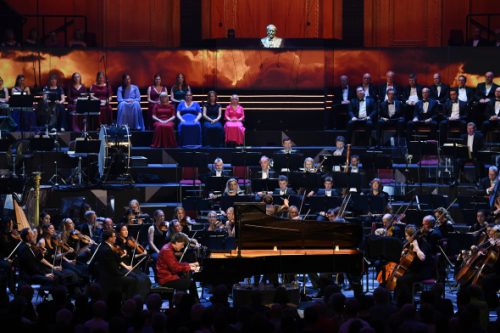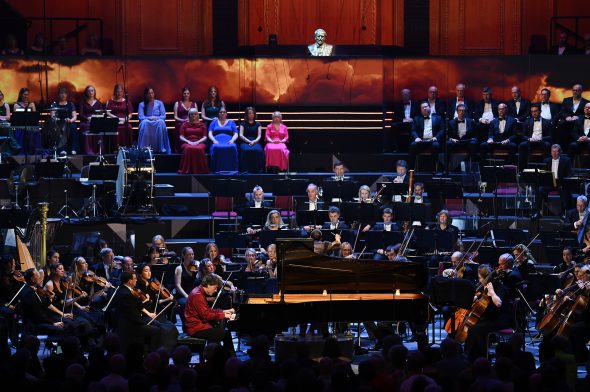
 United Kingdom Prom 1 – First Night of the Proms: Lesley Manville (actor), Paul Lewis (piano), BBC Singers, BBC Symphony Chorus and Orchestra / Dalia Stasevska (conductor). Broadcast live (directed by John Williams) from the Royal Albert Hall, London, 14.7.2023. (JPr)
United Kingdom Prom 1 – First Night of the Proms: Lesley Manville (actor), Paul Lewis (piano), BBC Singers, BBC Symphony Chorus and Orchestra / Dalia Stasevska (conductor). Broadcast live (directed by John Williams) from the Royal Albert Hall, London, 14.7.2023. (JPr)

Sibelius – Finlandia, Op.26; Snöfrid, Op.29
Bohdana Frolyak – Let There Be Light (BBC commission: world premiere)
Grieg – Piano Concerto in A minor, Op.16
Britten – The Young Person’s Guide to the Orchestra, Op.34
The 2023 BBC Proms opened with a concert of primarily Nordic music which directly – or as a metaphor – reflected the ongoing struggle of the Ukrainian people to repel the Russian invasion of February 2022. It ended with Britten’s The Young Person’s Guide to the Orchestra which sounded rather trite in comparison. Whose brilliant idea was that?
On the podium for the Prom was the BBC Symphony Orchestra’s principal guest conductor Dalia Stasevska. The presentation of this Prom on BBC TV left much to be desired and – whilst fast-forwarding through much of it – it was clear that Clive Myrie who introduced the broadcast was rather too enthusiastic, whilst there to comment on what we were hearing, Sandi Toksvig was typically erudite and organist Anna Lapwood sometimes struggled to get a word in. It was Stasevska’s interview with Toksvig which told us much about the thoughts behind the programmed music, though that was shown during the interval instead of before the concert. ‘I’m a Finn with Ukrainian heart,’ Stasevska explained, ‘One of my brothers is living in Ukraine, he moved just a few months before the war started … He’s a musician, he was one of the first ones who went to Bucha actually, and he went there with a cello and he was the first one to play in the destroyed concert hall and he played Bach there. And he said to me something extremely moving that they tried to destroy us but as long as we come here and we play music we are the first green grass that comes out of the ruins.’
Ukrainian composer Bohdana Frolyak (b.1968) had been commissioned to compose something new for this Prom and Stasevska introduced it by saying ‘The piece is Let There Be Light … Ukrainians are in such a horrible situation. They are so powerful inside and they believe that there will be light.’ As someone who expects percussion – and yet more percussion – in any new work Let There Be Light was immediately accessible with its suggestion of the changing landscape of Ukraine against the backdrop of the desolation and despair of some parts of the country. Oddly Frolyak seems to have been influenced by the French Impressionists and Debussy’s Pelléas et Mélisande and Prélude à l’après-midi d’un faune, as well as Ravel’s Daphnis et Chloé came to mind. Let There Be Light was basically, slow, meditative and ultimately prayerful, especially with the last pages underpinned by a tolling harp and getting an elegiac, slightly eerie ending.
The Prom began with the rarely performed choral version of Sibelius’s tone poem Finlandia. Composed in 1900 it depicts – if not initially because of the circumstances at the time – the struggles of the Finnish people against their Russian overlords. Sibelius’s later revisions have turned it into Finland’s unofficial national anthem with words such a ‘O Finland, see, your day is dawning … O arise, Finland, show the world that you have thrown off slavery and that you did not bend under oppression.’ (Very easy to swop nations here and replace Finland with Ukraine.) Rousingly patriotic it was given a superb performance from the threat hanging over Finland heard in the opening to the rousing conclusion of the hymn at the end – which depicts the Finns embracing democracy – which showcased the massed ranks of the BBC Symphony Chorus and, notably, the recently reprieved if still threatened, BBC Singers who were rapturously greeted before the music started.
Premiered only a few months after Finlandia in 1900 Snöfrid is described as an ‘improvisation for narrator, mixed choir and orchestra’. It is the setting of a poem by Swedish writer Viktor Rydberg with the spoken part – which we heard intoned by Lesley Manville dressed in shimmering gold – in an English translation by Edward Kemp whilst the chorus sang in Swedish. The plot on which it is based is redolent of ancient Scandinavian ballads. Sibelius apparently commentated how he ‘wrote Snöfrid more or less at one sitting after I came home from three days of lively celebrations’. The female protagonist Snöfrid appeals to her compatriots, in particular the warrior Gunnar, to fight for freedom rather than seek fortune, fame and pleasure. Once again Sandi Toksvig was spot on when she described this odd work as ‘a metaphor for Finnish independence’. This was especially when we heard these words from Manville: ‘Better death in a ditch in the service of virtue than fanfares obtained in pursuit of a name … wage the unwinnable war and die a nameless death, that’s the true end of the hero’s quest.’ It is several minutes of musical turbulence, which made me think of Mahler’s Das klagende Lied (which was influenced by Wagner’s operas steeped in Nordic legend and mythology) and has a full-on Mahlerian ending reminding listeners of his ‘Resurrection’ Symphony. It was once again splendidly played and sung.

The remainder of what we heard was not so profound and first was Grieg’s Piano Concerto, a youthful work stemming from 1868 when the composer was twenty-four. Introduced on TV by showing the opening of the celebrated 1971 Morecambe and Wise sketch with conductor André Previn which included the immortal line about how Eric Morecambe – as the ‘soloist’ in the Grieg Paino Concerto – was playing ‘all the right notes, but not necessarily in the right order’. Grieg’s music is something we are perhaps also too familiar with and while we were experiencing Paul Lewis’s keyboard mastery at its peak; his rather laidback style was at odds with Stasevska’s expansive gestures as she guided him and the orchestra though the concerto. There are evident homages to Norwegian folk music and – notably in last movement which ramps up – to Norwegian folk dance. Lewis’s nimble fingerwork was impressive in the closeup camerawork with his hands a blur during the trills and delicately understated florid runs. Of course, the first movement’s cadenza was as virtuosic as it should be, but still, there was a feeling that it would have benefitted from more flamboyance from the soloist. By the time the concerto ended dramatically with Lewis and the orchestra uniting to play three final chords it was obvious what an inspiration this concerto was to Gershwin and his Rhapsody in Blue.
Concluding this opening concert of the 2023 BBC Proms season was Britten’s The Young Person’s Guide to the Orchestra. It is something I have never heard before and will not worry about hearing again. I understand Britten based it on Rondeau, the second movement of the Purcell’s 1695 Abdelazer Suite. Through thirteen variations and a fugue it shows off the various sections of an orchestra. It was originally commissioned for the British educational documentary film Instruments of the Orchestra (released on 29 November 1946) directed by Muir Mathieson and featuring the London Symphony Orchestra conducted by Malcolm Sargent (those watching on TV were shown a clip of this). The music had no challenges the BBC Symphony Orchestra could not overcome and it gave many of the players a deserved moment in the spotlight. The musicians had been wonderful throughout the Prom playing for all they were worth for Stasevska but despite the Britten bringing everything to a joyous conclusion I felt it would have been better left to a Schools Prom and was not suitable for a first or possibly other ordinary one.
Jim Pritchard
